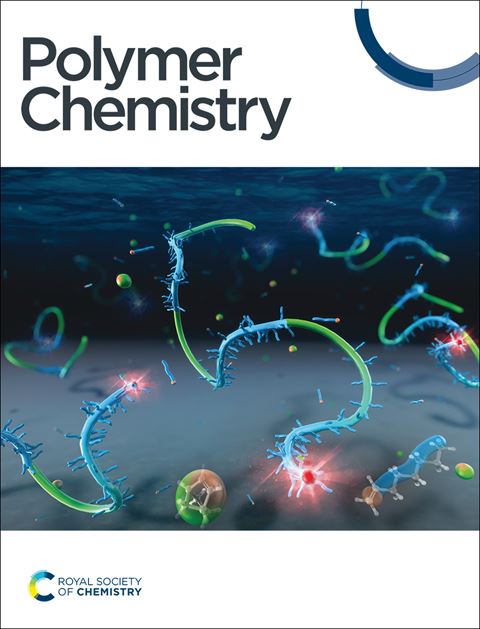Reversible Addition-Fragmentation Chain Transfer Depolymerization of Poly(methyl methacrylate) in Toluene
IF 3.9
2区 化学
Q2 POLYMER SCIENCE
引用次数: 0
Abstract
Controlled depolymerizations of poly(methyl methacrylate) (PMMA) via reversible addition fragmentation chain transfer (RAFT) reach higher yields in some solvents rather than others, and the exact reasons are not fully understood. PMMA was synthesized with trithiocarbonate (TTC) and dithiobenzoate (DTB) end groups to study depolymerization in toluene, which has been reported to have a lower monomer yield than other solvents. In toluene, the depolymerization kinetics were found to have two regions: one assisted by solvent-derived impurities and another being primarily self-initiation. Using a rate order analysis, we found evidence that initiation can lead to simultaneous homolysis of the RAFT end group and the depropagation of one monomer. Additionally, DTB end groups had a greater tendency than TTC end groups to undergo elimination, terminating the active depropagating center and limiting depolymerization extent. Radical thermal initiators were added into PMMA depolymerizations in toluene, demonstrating that di-tert-butyl peroxide can increase the conversion of polymer to monomer for TTC end groups.聚甲基丙烯酸甲酯在甲苯中的可逆加成-断裂链转移解聚
通过可逆加成裂解链转移(RAFT)对聚甲基丙烯酸甲酯(PMMA)进行控制解聚,在某些溶剂中收率较高,具体原因尚不完全清楚。以三硫代碳酸酯(TTC)和二硫代苯甲酸酯(DTB)为端基合成PMMA,研究其在甲苯中的解聚反应。在甲苯中,发现解聚动力学有两个区域:一个由溶剂衍生的杂质辅助,另一个主要是自引发。使用速率顺序分析,我们发现起始可以同时导致RAFT端基的均解和一个单体的去增殖。此外,DTB端基比TTC端基有更大的消除倾向,终止了活性退聚中心,限制了解聚程度。将自由基热引发剂加入到PMMA在甲苯中的解聚过程中,表明过氧化物二叔丁基可以促进TTC端基的聚合物转化为单体。
本文章由计算机程序翻译,如有差异,请以英文原文为准。
求助全文
约1分钟内获得全文
求助全文
来源期刊

Polymer Chemistry
POLYMER SCIENCE-
CiteScore
8.60
自引率
8.70%
发文量
535
审稿时长
1.7 months
期刊介绍:
Polymer Chemistry welcomes submissions in all areas of polymer science that have a strong focus on macromolecular chemistry. Manuscripts may cover a broad range of fields, yet no direct application focus is required.
 求助内容:
求助内容: 应助结果提醒方式:
应助结果提醒方式:


